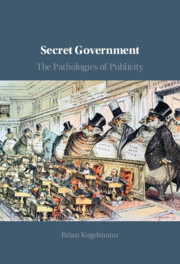Book contents
- Secret Government
- Secret Government
- Copyright page
- Dedication
- Contents
- Tables
- Acknowledgments
- Introduction
- Chapter 1 Publicity in History
- Chapter 2 Democracy Thrives in Darkness
- Chapter 3 Open versus Closed Deliberation
- Chapter 4 Publicity and the Rule of Law
- Chapter 5 Government House Moral Theory
- Chapter 6 Seeing Justice Done
- Chapter 7 Mutual Knowledge of Justice
- Chapter 8 Putting the Philosopher in the Model
- Conclusion
- References
- Index
Chapter 8 - Putting the Philosopher in the Model
Published online by Cambridge University Press: 04 November 2021
- Secret Government
- Secret Government
- Copyright page
- Dedication
- Contents
- Tables
- Acknowledgments
- Introduction
- Chapter 1 Publicity in History
- Chapter 2 Democracy Thrives in Darkness
- Chapter 3 Open versus Closed Deliberation
- Chapter 4 Publicity and the Rule of Law
- Chapter 5 Government House Moral Theory
- Chapter 6 Seeing Justice Done
- Chapter 7 Mutual Knowledge of Justice
- Chapter 8 Putting the Philosopher in the Model
- Conclusion
- References
- Index
Summary
John Rawls’s full publicity condition says that persons in the society the philosopher theorizes about must in some sense have access to everything the philosopher says in her theorizing. In other words, everyone living in Rawls’s perfectly just society must have access to A Theory of Justice and related works. This account of publicity is the most difficult to analyze because there are many different interpretations of what, precisely, it requires and also many different arguments in its favor. Not only this, but certain criticisms of Rawls that some deem fatal to his project depend on particular interpretations of this publicity condition that can quite reasonably be rejected. In the current chapter I show that, once again, we face deep trade-offs. Insisting on this account of publicity will change the way political philosophy must be done, but doing so will help achieve normatively worthwhile ends.
- Type
- Chapter
- Information
- Secret GovernmentThe Pathologies of Publicity, pp. 188 - 211Publisher: Cambridge University PressPrint publication year: 2021

